A story of the American Heritage Festival, as told through a recruit of General Washington’s Continental Line.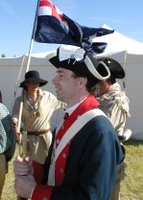 From the battlefield journals of Christopher Francis
From the battlefield journals of Christopher Francis
Photos by Michael Cynecki (Click any one for a larger view)
A spontaneous cheer arose from the throngs of children as the commandants of His Excellency took the wide, grassy battlefield. Flanked by wind-lifted flags, the troops fell into line with the dignity befitting soldiers: the
Continental Line in their red, white and blue uniforms; the allies from Spain in their blue and gold; and a few militia. An ornately dressed French officer accompanied them.

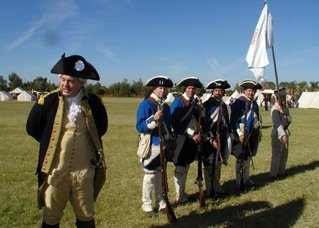
“Today,” General Washington proclaimed to the warriors and spectators, “we have the chance to strike a decisive blow for freedom.”
The redcoats soon marched into place, supported by a few turncoats -- militia urged at the last minute to switch allegiances and even the sides. His Excellency and the Frenchman walked to the center of the theatre of combat in the noonday sun to discuss a possible aversion of hostilities, although everyone understood the hopelessness of such formality.
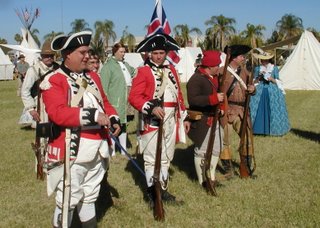
I stood with the Americans at this parley, a man of four and thirty who had traveled more than a hundred miles, temporarily abandoning my other life as a journalist to serve the noble causes of liberty and education.
Those in my township saw me off at dawn, emerging from my second-story apartment clad in white breeches, puffy shirt and knee-high stockings. Two women at the foot of the stairs halted their coffee-and-cigarette hyphenated conversation as they observed me on the landing, placing a three-cornered hat on my head and smiling at their befuddled gazes.
“I’ll explain in a moment,” I said before descending to them, taking care not to slip in my pewter-buckled shoes.
“Don’t you look cute, Chris!” said the tenant of the residence below.
“I’m going to Phoenix to educate some children in history,” their Colonial acquaintance offered with pride before strolling off to his modern carriage.
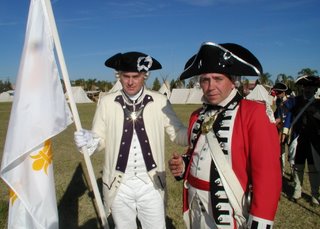
Now I stood silent as the conversation between the commanders deteriorated by the word. The British commander would have none of the rabble standing before him, especially not the Frenchman.
“This froggy,” the redcoat sneered, brushing off the alliance between the General and the Gauls.
Very well then. It would come to blows. I returned with the commanders to the line of patriots and promised myself I would not die this day, even if a bayonet should charge me.
The British carried muskets. I carried a flag.
= = =
Two years ago, I stood behind the safety line, watching the combat unfold before me as a curious spectator. I did the same the next year, and upon the conclusion of those battles, I determined I could not -- and would not -- merely watch again.

The path to the battlefield wound through several social adventures, divergent in time and place. I perceived myself more gentleman than soldier, but I gathered many of my ancestors found themselves in the same situation, taking up arms when confronted by tyranny even though they had never dreamed of shedding another man’s blood. That was provided, of course, they had arms to take up.
In July, four months before battle, I placed an order for a musket and expected it would meet my hands in time for at least a few practice shots. Weeks elapsed, and the French firearm under Indian craftsmanship failed to arrive. The delay frustrated the middleman as much as the buyer. No explanation surfaced for the holdup other than copious holidays in the faraway land.
The possibility of arriving on the battlefield unarmed disturbed me, but surrender was out of the question. I possessed the Continental uniform, tailored to exact dimensions by expert tailors. They required numerous precise measurements, which required me to perform numerous feats of dexterity with a tape measure. But lo, the result: a colorful vesture I could not wait to wear, topped with a black-and-white tricorn hat decorated with a huge cockade.
As for the musket, I found a solution in a Brown Bess I could borrow from a fellow patriot who would arrive later. Yet with hostilities sure to arise long before then, I informed General Washington I held myself open to other ideas: “I’ll chase those wretched redcoats with a pitchfork if I have to!”
= = =
The opening shots from the British immediately felled the three Spanish allies. Those redcoats made better shots than I realized, even over the sizable distance between the lines.
“They always shoot the flag-bearers,” a colleague had informed me.
My safety and the standard I held now depended on the half-dozen men under General Washington’s command.
“Fire at will!” he ordered, and the controlled sequence of volleys loosened.
Musket fire crackled from both sides. Jets of smoke zinged from muzzles -- sans balls, of course -- punctuated by the frightening flashes of flame all along the line… except for the weapon of the French officer next to me. Powder from cartridge after cartridge flowed into the pan and down the barrel with no incendiary result, just a click. Other Continentals soon found themselves plagued by misfires. The British fired and advanced with no sign of weapons trouble.
“Let’s give them a volley,” General Washington commanded.
The troops opened up on their foes with dismal results. Now we had no choice but to charge. Rushing the redcoats, they surrendered before a bayonet pierced a single ounce of flesh. Hands went up, weapons went down, and the battle ceased. Somehow the patriots won this round, against all odds and all weapons, much to the joy of the children on the sidelines.
“Resurrect!”
Like waking up from a deep sleep, our fallen comrades arose, brushed themselves off, and fell into line again as the young spectators cheered an American victory. Huzzahs for the patriots. A cheer for the redcoats. Honors for the Catalonian allies, the militia and mountain men, and the French officer.
Now another volley hit us: the questions from the children. I soon noticed they preferred one more than others.
“Did you die?”
“I am still standing, no?” the Frenchman replied.
“Not today,” I said. “Some musket balls came close. Tomorrow, I might not be so lucky.”
I made note of a small scab on my right hand. I knew not where it came from, but I could surmise a period guess to convey a sense of danger. “That was from a bayonet.”
Children swarmed around me as my fellow Continentals fell out to leap forward along the timeline for the next skirmish.
“Is that flag heavy?”
“Not really.”
“Are those stockings comfortable?”
“Yes, more than any trousers I’ve ever worn.”
“Are you a redcoat?”
“No. Don’t let the red facings on my coat fool you.”
“Can I wear your hat?”
“Yes, for a moment.”
“Can we take your picture?”
I would pose several times for the wee folk, letting them gather round while smiling and striking a proud pose with the sun in my eyes. I would also sign several autographs. I beamed with happiness to be their hero for this moment, having taught them something about their heritage.
One child had something more in mind.
“I challenge you to a dance-off!”
In the brief showdown between capers of 1776 and 1976, no distinct winner emerged, but my spirited jig left the youngster in stitches.
= = =
I have never seen so many children fascinated at a hole in the ground, I thought as multitudes of children crowded around a work in progress: an 18th Century camp kitchen. The trench still needed three holes in the side and three more in the top -- pits for fire and chimneys for it to rise.
A Connecticut militiaman and his son took turns digging, breaking a sweat early in the morning, but they summoned me for help and a momentary respite from tossing aside shovelfuls of dirt. I jumped into the pit without hesitation and went to war with the soil. Heaving lumps of earth reminded me of back-weary campaigns against driveway snow during many a Missouri winter.
Waves of children crashed into the camp as the Connecticut duo explained the mechanics and use of this six-foot long by two-foot deep hole.
“Is it a grave?” one child asked.
New groups of children arrived and the spiel began again until the militiaman extended an invitation to me.
“You can explain what we’re doing.”
Me? Now?
Uncertainty of all the facts gnawed at me, but I started repeating the ones I picked up moments ago.
“This is an 18th Century camp kitchen,” I began. The words labored from my mouth as I checked every one of them for accuracy.
“They’re digging three holes in the side here. That’s where the fire is going to be built. They’ll dig more holes on the top, and the flame will come through there, and you will put your kettle on top to cook. The reason it’s built like this is to protect the fire from the wind and rain.”
After a few rounds with different groups of children, I hit a stride. The youngsters could not tell how green this recruit was in his red, white, and blue.
“The life of a Revolutionary War soldier wasn’t all marching and drilling.”
The militiaman and his son continued their labors as water poured down their foreheads, stopping only to inspect their work and answer a few questions. They reached for their bayonets.
“General Washington doesn’t like us to use these for digging,” the father explained. “But they make excellent vent picks.”
One hour of digging and picking, and the kitchen stood ready for service. But a flint failed to start a suitable fire.
“We’re going to cheat a little,” said the militiaman, turning to an oil lamp.
A fellow Continental observed the process with a teacher friend who had brought her class.
“Hey, I learned something new today,” he said. “You know what the difference between a pot and a kettle is?”
“What?”
“A kettle has straight sides. A pot has a curved side, like a pot belly.”
I had never thought of that, either -- another new fact to pick up and pass on. On this day, the children would learn as much as I.
= = =
“
Christophe!” the French commander called to me at sunset, advising I should seek a certain gentleman for some brief instruction in the proper firing of a musket.
The lesson took place behind the Confederate encampment. We used a rifle different than the flintlock I would fire the next day, but nearly the same procedure applied.
Set the lock here. Reach for a cartridge. Tear it open with your teeth. Not too deep, or you’ll eat gunpowder. Put a little in the pan. Close the frizzen. Put the rest in the barrel. Set the hammer all the way back.
“Fire in the hole!” I shouted before pulling the trigger, mimicking the warning I had heard my instructor give in the camp.
Click.
Thoom! A flash of fire and smoke burst forth from the muzzle.
“Eureka!” I cried, eyes wide and mouth open in joyous satisfaction. “That’s the first time I’ve ever fired a musket.”
“Rifle,” my instructor happily corrected.
= = =
A mist of smoke from cannons and campfires loomed over the twilight battlefield. The commanders had decided on a skirmish at dusk, and the Union forces had invited me into the fray, adding some red and white to their blue even though I was still unarmed.
With the public now gone, the rules and timelines would both bend this evening. Japanese fighters from World War II fell into line with the Confederates. An Allied gunner and his automatic weapon joined with Grant’s forces, and he quickly fell to his stomach, making a long crawl to penetrate enemy lines.
A patriotic boy slipped me a toy musket as I set off behind a mountain man to flank the rebel troops. Both of us knew a lack of cover would doom the operation to failure.
“What do we do?” the mountain man grinned as the men in gray approached.
We decided to keep walking until the
1st Virginia unleashed their opening volley.
“Let’s die,” the leader of the hopeless plot declared, and both of us tumbled to the ground.
The rebels yelled and cannon fire exploded, shaking the ground with every blast. I stared straight into space as stars emerged from the blanket of darkness.
“You really look dead,” an observer pointed out as he passed by the two fallen fighters with a camera in hand.
Yet we had enough life to crack inside jokes as the battle played out, chuckling at the creative anachronism and wondering about mixing and matching soldiers from other eras. Sizable patches of smoke hung over the battlefield when we resurrected ourselves, the fog of war.
“We gotta do this again.”
= = =

The British formed in front of us, always second on the battlefield. We stood as we did before: the Continentals on one side, Catalonians on the other, our French ally in the ranks, and a cannon primed to fire.

The redcoats sent a contingent to the center of the field to discuss terms, but they mainly wanted our surrender.
“Give them our answer from Pennsylvania!” shouted General Washington.
The cannon was lit. Nothing.
Crestfallen, we would have to talk with the lobsterbacks after all.
As the officers ran through the formalities, all I could think about was the loaned Brown Bess on my shoulder and the steps for firing it. Rolled cartridges of black powder waited inside a hip pack. My gaze hung on the redcoats in front of me.
A year of exploration and curiosity had culminated in this moment, stoked by travels to Williamsburg, Yorktown, and Jamestown, a dance every so often, and a determination to conduct life in a manner befitting the better bred. Now the next step laid in front of me, and I reminded myself, even in this predetermined battle, this could be the day that I die.
“Load and prime!”
I pulled back the hammer halfway and opened the musket frizzen. My right hand dug for a powder cartridge. I tore off the paper end with my teeth, making sure I spit the wad out with the gusto of a whole-hearted soldier. My hands trembled, though, as I filled the pan with a touch of powder, snapped down the frizzen and poured the rest of the charge down the barrel.
“Come to the ready!”
I aimed for the nearest redcoat. Any of them would do, whether I could see the whites of their eyes or not.
“Fire!”
My finger pulled the trigger, and to my intense relief and satisfaction, the pan flashed and white smoke exploded from the muzzle.
“Load and prime!”
The process sped up as I repeated it. The redcoats refused to surrender, and I couldn’t waste time as I squeezed off more shots, falling behind my brothers in arms but still firing. The others on the line shouted the praises of our French and Spanish allies. In the rush to keep up with the rest of the line, I bit off too much of a charge and ended up spitting powder out of my mouth along with the wrapper. I did not think I would have enough left for the gun. A click from the trigger confirmed it.
“Load and prime!”
I went through the motions again, adding more powder to the barrel and the pan… wait.
What am I doing? I have put too much in there! I promised my family, my friends, and my colleagues in my other life and time I would return with all ten of my fingers.
“Fire!”
BLAM!
A huge cloud of smoke poured out, but my limbs remained unscathed.
“A double dose for you!” I shouted to the redcoats.
The cannon started working, finally, as we traded shots with the British. But it did not hold them off. They kept advancing, and I could not tell who was living or dying, but I knew this battle -- adapted from an actual skirmish -- was not ours to win.
The General ordered us to retreat, our numbers thinned. I survived to fight again, and His Excellency promised the crowd we would receive drilling from Baron von Steuben before the next battle. The barrel of the borrowed Brown Bess still smoked from firing all but one of my shots, so I declared a personal victory.

We returned to do battle again after a quick lunch, this time with some cunning and misdirection thrown into the plan. Our militia men would fire and fall back, serving as the bait to draw the British forward into a trap, at which time the Continentals and allies would unleash their black-powdered wrath upon them.
It worked beautifully. The second battle found me getting the commands down, and my timing at firing shots with the rest of the line improved. We set off at least two or three good volleys, but I heard talk of running with bayonets.
“Charge!”
We didn’t have time to fix any bayonets. I never heard the order to. I chased after the redcoats with a glorious grunt.
General Washington delivered an insider’s command: “Somebody needs to take a hit.”
A loyalist militiaman knelt with his rifle not fifty feet in front of me. A puff of smoke bloomed from his piece… and down I went.
Death came quick and merciful -- no time to fester on the field of battle and reflect on the price of liberty, facing towards Heaven and consoling myself that the cause of the righteous would not die with me as the life drained from my body.
“Resurrect!”
The crowds of spectators applauded and cheered as I arose, swept the grass from my breeches, and fell back into line with my fellow Continentals. Three cheers for the Spaniards. Three cheers for the French. Three cheers for our worthy adversaries -- small cheers.
Questions followed, and I answered many of them about the musket. The spiel had firmed itself in my mind by now, and although my first official day on the battlefield continued, I spoke with the confidence of a seasoned soldier. A group lingered around me after my fellow linesmen departed for the next battle on the timeline.
= = =
“What are your plans for dinner?”
“I don’t know,” I said.
I had no cooking supplies, no foodstuffs, no mess kit except for a tin cup purchased only that morning. I had no tent, relying on the hospitality of a nearby inn. The realization sunk in that I needed a lot more than just a musket of my own, something I had not wanted to admit around seasoned re-enactors who had been doing this for years.
“We’re having lamb,” the Connecticut militiaman offered. Lamb with asparagus, bread, peach cobbler and lemonade, served in period-correct style. His family was putting the camp kitchen I helped build to use, and he invited me to share in the feast.
That was only the beginning. Before we sat down to dinner, he had donated the beginnings of what I needed: a tin plate, a wooden bowl, a spoon, and a lead mug which came with a warning: “Don’t drink out of it too often. You’ll go stupid.”
Our Catalonian friends soon joined us with Spanish stew, and we all enjoyed a twilight meal next to the well-performing fire trench helmed by its talented chefs. The lamb bathed my mouth in flavor, a welcome surprise having never tasted that delicacy before. I enjoyed every bite while sharing warm conversation and sipping the double-lemony lemonade. The cobbler took longer to cook than we expected, but the wait proved worthy. For a Continental private, I ate like an officer, the generosity of the militiaman’s family catching me by surprise and humbling me beyond words save for the ones of gratitude I spoke with an 18th-century bow and deep appreciation. Thanksgiving dinner had come early. And after this feast, I still had room for pie offered by the gracious Catalonians.
Across the camp, candelabras glistened from a long table and bursts of laughter pierced the night air as the Officers’ Social came to life. Campfires dotted the encampment, bathing the tents in an orange glow as the long day of battles and demonstrations wound down and the soldiers swapped stories of life. Music from a guitar floated through my ears. Capes covered arms as the wind chilled underneath the starry sky. I put some thoughts to paper by the light of an oil lamp, but curiosity would not allow me to sit still the entire night.
As I soaked in some tales of the Wild West from a nearby tent, I noticed the officers approaching, merry from an evening of fine food and drink. General Washington and President Lincoln were in excellent company with General Grant and a host of military leaders from the eighteenth, nineteenth and twentieth centuries, a collusion of friends in history united in a common mission to enlighten the future.
“Are you a wandering minstrel?” General Washington asked as he caught a glimpse of me.
“A wandering writer,” I smiled.
The gathering halted by the eighteenth-century encampments, where an officer presented His Excellency with a gift: a medallion of General Washington taking command of this troops.
“You have opened the gates and they can’t be closed again,” an officer praised, noting how the work of
We Make History marked a fresh and uplifting new start in the future of recreating the past in Arizona.
I heard His Excellency repeat a maxim of service I have often heard: “If we will live a life giving what we have to give, we will not only enrich our own lives but enrich the lives of others.”
Others soon gathered around, and an early Christmas celebration manifested itself with caroling and the peace of good will towards all under the stars.
“You look exhausted,” General Washington observed of me in the dim of night.
Exhausted, yes, exhausted physically and emotionally. In the course of a single day, I had re-enacted two battles, firing a musket for the first time in my life via the generosity of another. I saw children and adults fascinated and brimming with questions. Several re-enactors offered generous invitations to join up with their units. I broke bread with newfound friends. I heard numerous and fascinating historical accounts, more than I would ever recall. And this day had followed a day of enlightening excited youngsters and taking my first opportunity to teach as a living historian.
“Come with us,” the General offered. “You are family now.”

Oh, how I knew it. How blessed was I. How blessed was this hobby I had chosen and its practitioners, a blessing reaffirmed the next day when The Rev. George Whitefield -- an outstanding clergyman with an unmistakable gift for oratory -- drew us together for morning prayers and hymns in a nearby field. During the course of his sermon, he spoke of the meaning of names and how many were chosen in reverence to God.
I recalled the meaning of mine in Greek: Christopher -- the bearer of Christ.
Tears streamed down my cheeks.

= = =
The fourth and final Revolutionary War skirmish repeated the scenario of using the militia to draw the British into a trap. Again it worked. The final score for the weekend: Patriots 3, Redcoats 1 -- not exactly fair to both sides, but more than fair when the crowds were expecting American victories.
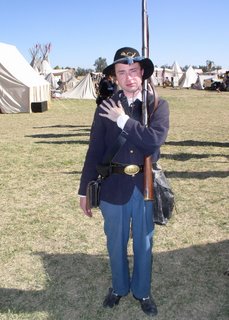
Afterwards, my turn came to leap forward a century on the timeline. The friend who lent me the Brown Bess lent me a Union army uniform, cartridge case, belt, haversack, bayonet, and rifle, and I fell in with Grant’s forces.
I quickly found my manual of arms a comedy of errors. During the commands “left shoulder arms” and “protect arms” and “support arms,” either my hands or my rifle were not quite in the correct position, so I would manipulate the rifle to the correct position, then manipulate my hands, then eye the soldier next to me and make adjustments.
The recruit on my left helped immensely as we marched onto the field of battle.
“It helps to think of every command as three positions,” he told me and showed me how it worked. It may have helped him, but I don’t think it helped me. I needed to drill more than anything else, looking sloppy as I readjusted my hands with every command.
“I’ll never get the hang of this,” I mumbled during one march.
“It gets easier,” my comrade replied.
I had never fired a Civil War-era rifle before, but I picked up the procedure on the field. In some ways, I found it easier than the Bess, pouring the whole cartridge of powder down the barrel without sparing some for the pan. A percussion cap set it off, something not too dissimilar from the ones I used to shoot off as a kid. But as I would soon find, those caps were a pain… in more ways than one.
During the first volley unleashed with the Yanks, my ears rang and a chill ran through my body. I knew I was in trouble when I saw my comrades sticking plugs into the sides of their heads. The other problem: those metal caps refused to stay on. The helpful recruit recommended squeezing each one together a little. I tried it, and one time I squeezed the cap into a unusable crushed lump. Sometimes I would reach for a cap and dig out two stuck together, or they would fall out of my hands and into the thick grass. I lost two caps in a row that way. Meanwhile, my fellow recruits came to the ready and fired effortlessly.
I was out of step, out of sequence with the rest of the unit and it annoyed me terribly. I thought of what it would mean in actual battle. I would not survive 10 minutes in the ranks of Lee or Grant. But then again, perhaps my historic persona was drafted, no professional soldier by any means, no ace with a rifle nor any overwhelming desire to handle a firearm. I am sure I had more than a few historical brethren in that respect -- good people, poor soldiers, the rifles like butter in their fingers.

Never have I served in any military unit in any capacity. My dexterity with a rifle would incur the wrath of any drill sergeant laced with a sizable earful of spittle. Here, I was lucky to get off with friendly words of advice from fellow re-enactors who have learned their lessons on the battlefield.
“You’re holding your rifle there,” one Union commander informed me as he saw the stock of the rifle slipping into my armpit. “If there would have been a real ball in there, you would’ve felt that kick like a mule.”
I had felt it before, long ago in the Boy Scouts, when I fired a black powder rifle and the recoil stabbed me in the shoulders.
“It backfired!” I cried.
The adult leaders laughed about it around the campfire after supper, not minding I was in earshot.
We lost one battle to the rebels, the
1st Virginia even taking one of our cannons and mounting it in victory as we marched into retreat. We would take them out in the next skirmish, one where my borrowed brimmed hat would blow off my head on the battlefield while I ran after a rebel.
I hardly knew what I was doing, and yet my commanders and comrades were glad I was along to fill out the dwindling ranks of re-enactors. The crowds did not mind either as they applauded the blue and the gray.
The afternoon dissolved into evening, and I switched back into my eighteenth-century attire for a remaining hour at camp, the spectators leaving and the participants packing up. I made my rounds of goodbyes and thank-yous and see-you-soons and slipped back into my modern-day self-driven carriage.
Three days of living in the past, now concluded. Or maybe not.
I thought my newsroom colleagues would get a kick out of seeing me in the full uniform of the Continental Line, so I made a stop there on the way home, even though I was tired, achy and coughing from residual effects of dust and gunsmoke.
And I wanted them to see it -- wanted them to understand my love for living in the past and what it did for others.
To my surprise, the general manager, the general in my other life and time, had dropped by for a Sunday visit. From across the workplace, he grinned as he saw a figure approaching in red, white and blue, topped with a tricorn hat.
“Mr. Arnold!” I greeted, still in my 18th Century mannerisms as I presented myself to him, a humbled soldier fresh from the battlefield, eager to tell a tale of fighting for liberty.
More from this remarkable weekend at www.americanheritagefestival.com!
 Emerging into the ballroom in my top hat, tail coat, and red waistcoat, I find myself in a scene more reminiscent of 1861 Virginia than 1840 London, with the gentlemen of the 1st Virginia Volunteer Infantry in full dress uniform. They welcome the arriving guests and put out the call for more recruits. Those Yankee aggressors must be stopped.
Emerging into the ballroom in my top hat, tail coat, and red waistcoat, I find myself in a scene more reminiscent of 1861 Virginia than 1840 London, with the gentlemen of the 1st Virginia Volunteer Infantry in full dress uniform. They welcome the arriving guests and put out the call for more recruits. Those Yankee aggressors must be stopped.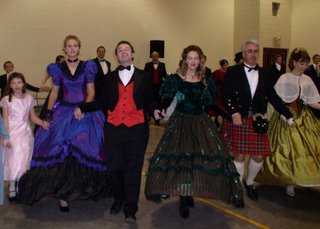
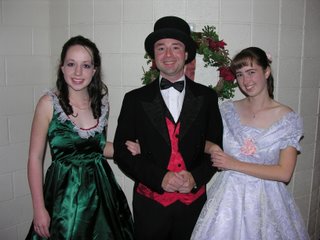 Even as a guest of six previous balls, I still consider myself somewhere between a beginner and an expert when it comes to set dancing. So when we end up as head couple to begin the dance, I know I have to prove my worth. But more than that, I have to convince my partner as well as the others along the line that any mistakes are no cause for alarm. Do not fret. Do not panic. Continue on with the joy of the dance in your heart and all deviations will fade like snowflakes into the white drifts of winter. “You’re doing fine!” I coach. And at the end, I bow deeply and offer my thanks and compliments on my partner’s dancing, which require no embellishment.
Even as a guest of six previous balls, I still consider myself somewhere between a beginner and an expert when it comes to set dancing. So when we end up as head couple to begin the dance, I know I have to prove my worth. But more than that, I have to convince my partner as well as the others along the line that any mistakes are no cause for alarm. Do not fret. Do not panic. Continue on with the joy of the dance in your heart and all deviations will fade like snowflakes into the white drifts of winter. “You’re doing fine!” I coach. And at the end, I bow deeply and offer my thanks and compliments on my partner’s dancing, which require no embellishment.














